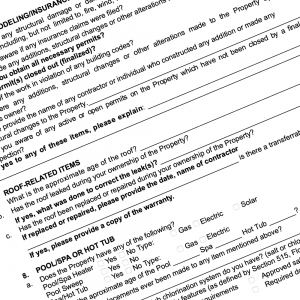Disclosure is among the most important terms in the real estate lexicon.

Engage in any real estate transaction, especially here in NE Florida, and you’ll be introduced to any number of standard disclosures. Homeowner’s association disclosure, CDD fee disclosure, seller’s disclosure…there’s even a coastal construction line disclosure if you happen to be involved with property at the beach.
All of these disclosures are fairly self-explanatory. But when we talk about disclosure in the broader sense—what did you know, when did you know it and whom did you tell—things can get a little murky.
Start with the Seller’s Disclosure
Here in NE Florida, we have a pretty detailed seller’s disclosure that home sellers can fill out with information about their property. Things like the year they purchased the home, condition/age of roof and mechanical systems, deed/HOA restrictions, water intrusion/wood rot, etc. But there are a few issues with the disclosure overall:
- It’s not required – home seller’s don’t have to fill one out
- Information included on the disclosure is to the best of the seller’s knowledge/recollection
- If a seller never lived in the property—if it was a rental, or a parent’s house, for instance—the disclosure is often not filled out
That said, there is one line from the seller’s disclosure that should be called out, as it has implications well beyond just the printed form:
“In Florida, a seller of residential property is obligated to disclose to a buyer all facts known to a seller that materially and adversely affect the value of the property being sold which are not readily observable by a buyer.”
In other words, if you’re a seller, and you know the front hallway floods during heavy rains, you must disclose it to any potential buyer. If you know there is mold/wood rot on sheathing in the attic, you must disclose (even if the inspector misses it). If you know that there’s a disused propane tank buried on the property, you must disclose it.
You get the idea.
But here’s the most important thing. If your agent knows about any of these defects, he or she must disclose them to any buyer, as well. And there’s no getting around it.
Agency is No Protection
Even if your agent is a single agent, he or she is still required to disclose any latent defects or facts about a property that may adversely affect value. This supersedes the duty of confidentiality owed to you by a single agent or limited confidentiality owed to you by a transaction broker. In fact, the legal descriptions of all three types of brokerage relationships available in Florida specifically include:
“Disclosing all known facts that materially affect the value of residential real property and are not readily observable to the buyer.”
Read more about the three types of brokerage relationships available to home buyers and sellers in the state of Florida.
The Value of a Pre-Inspection
So, now that we know we all have an obligation to disclose those latent defects, here’s an all too common scenario we run into during a real estate transaction.
Seller fills out seller’s disclosure to best of their knowledge.
Buyer makes an offer, and after some negotiation, seller agrees to price, timeframe, etc.
Within 10 days, buyer has inspections done at the property and a previously unknown defect is discovered.
Buyer and seller can’t agree on terms to remedy the situation, so buyer cancels contract, and seller goes back on market.
At this point, the seller really has two options…repair the defect uncovered in the inspection report, or disclose the defect on the seller’s disclosure and be prepared to re-evaluate asking price.
Point is, now that there is a “known fact that materially affects the value” of the property, those facts must be disclosed. And your agent will be required to disclose them, as well.
So, it makes sense to consider having a pre-inspection done before going on market. If any issues turn up, you can fix them yourself, or disclose them and price the home accordingly. Either way, you’ll save yourself time and heartache by addressing the issues up front, instead of being waylaid in the middle of a transaction when you’re busy trying to move out of your home and find a new one.

Leave a Reply